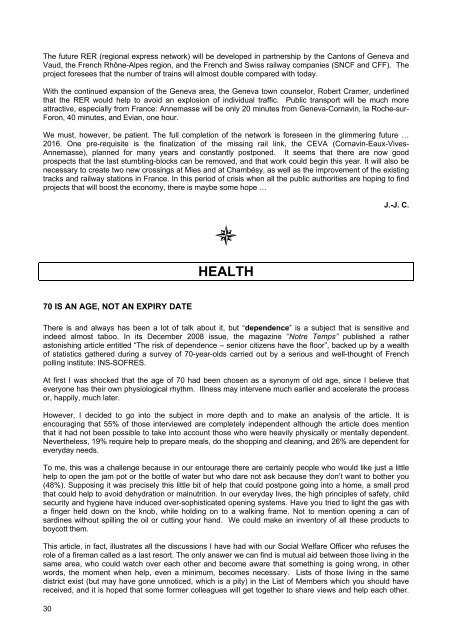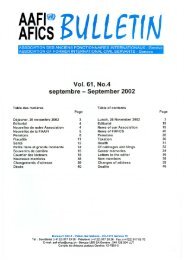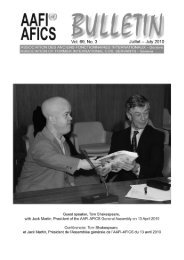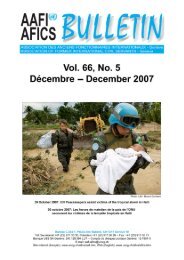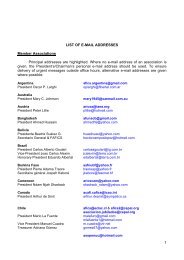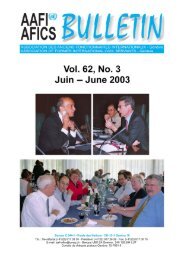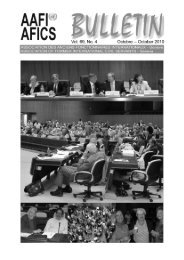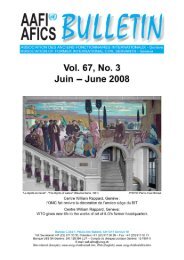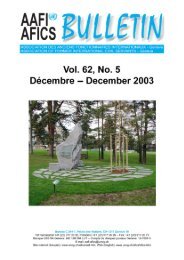VOL. 68, NO. 2 - AAFI-AFICS, Geneva - UNOG
VOL. 68, NO. 2 - AAFI-AFICS, Geneva - UNOG
VOL. 68, NO. 2 - AAFI-AFICS, Geneva - UNOG
Create successful ePaper yourself
Turn your PDF publications into a flip-book with our unique Google optimized e-Paper software.
The future RER (regional express network) will be developed in partnership by the Cantons of <strong>Geneva</strong> and<br />
Vaud, the French Rhône-Alpes region, and the French and Swiss railway companies (SNCF and CFF). The<br />
project foresees that the number of trains will almost double compared with today.<br />
With the continued expansion of the <strong>Geneva</strong> area, the <strong>Geneva</strong> town counselor, Robert Cramer, underlined<br />
that the RER would help to avoid an explosion of individual traffic. Public transport will be much more<br />
attractive, especially from France: Annemasse will be only 20 minutes from <strong>Geneva</strong>-Cornavin, la Roche-sur-<br />
Foron, 40 minutes, and Evian, one hour.<br />
We must, however, be patient. The full completion of the network is foreseen in the glimmering future …<br />
2016. One pre-requisite is the finalization of the missing rail link, the CEVA (Cornavin-Eaux-Vives-<br />
Annemasse), planned for many years and constantly postponed. It seems that there are now good<br />
prospects that the last stumbling-blocks can be removed, and that work could begin this year. It will also be<br />
necessary to create two new crossings at Mies and at Chambésy, as well as the improvement of the existing<br />
tracks and railway stations in France. In this period of crisis when all the public authorities are hoping to find<br />
projects that will boost the economy, there is maybe some hope …<br />
J.-J. C.<br />
HEALTH<br />
70 IS AN AGE, <strong>NO</strong>T AN EXPIRY DATE<br />
There is and always has been a lot of talk about it, but “dependence” is a subject that is sensitive and<br />
indeed almost taboo. In its December 2008 issue, the magazine “Notre Temps” published a rather<br />
astonishing article entitled “The risk of dependence – senior citizens have the floor”, backed up by a wealth<br />
of statistics gathered during a survey of 70-year-olds carried out by a serious and well-thought of French<br />
polling institute: INS-SOFRES.<br />
At first I was shocked that the age of 70 had been chosen as a synonym of old age, since I believe that<br />
everyone has their own physiological rhythm. Illness may intervene much earlier and accelerate the process<br />
or, happily, much later.<br />
However, I decided to go into the subject in more depth and to make an analysis of the article. It is<br />
encouraging that 55% of those interviewed are completely independent although the article does mention<br />
that it had not been possible to take into account those who were heavily physically or mentally dependent.<br />
Nevertheless, 19% require help to prepare meals, do the shopping and cleaning, and 26% are dependent for<br />
everyday needs.<br />
To me, this was a challenge because in our entourage there are certainly people who would like just a little<br />
help to open the jam pot or the bottle of water but who dare not ask because they don’t want to bother you<br />
(48%). Supposing it was precisely this little bit of help that could postpone going into a home, a small prod<br />
that could help to avoid dehydration or malnutrition. In our everyday lives, the high principles of safety, child<br />
security and hygiene have induced over-sophisticated opening systems. Have you tried to light the gas with<br />
a finger held down on the knob, while holding on to a walking frame. Not to mention opening a can of<br />
sardines without spilling the oil or cutting your hand. We could make an inventory of all these products to<br />
boycott them.<br />
This article, in fact, illustrates all the discussions I have had with our Social Welfare Officer who refuses the<br />
role of a fireman called as a last resort. The only answer we can find is mutual aid between those living in the<br />
same area, who could watch over each other and become aware that something is going wrong, in other<br />
words, the moment when help, even a minimum, becomes necessary. Lists of those living in the same<br />
district exist (but may have gone unnoticed, which is a pity) in the List of Members which you should have<br />
received, and it is hoped that some former colleagues will get together to share views and help each other.<br />
30


